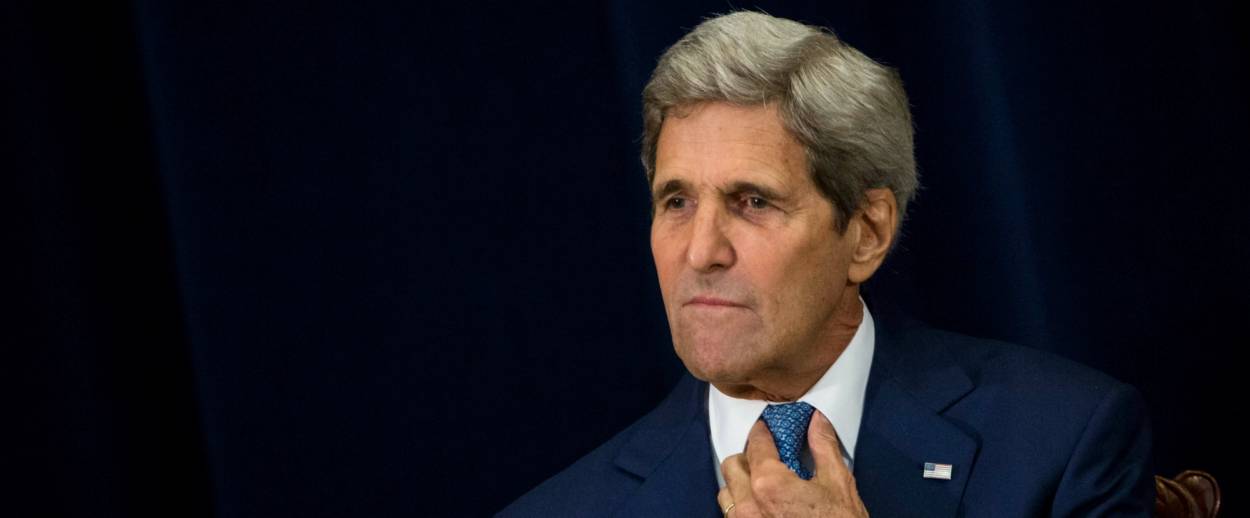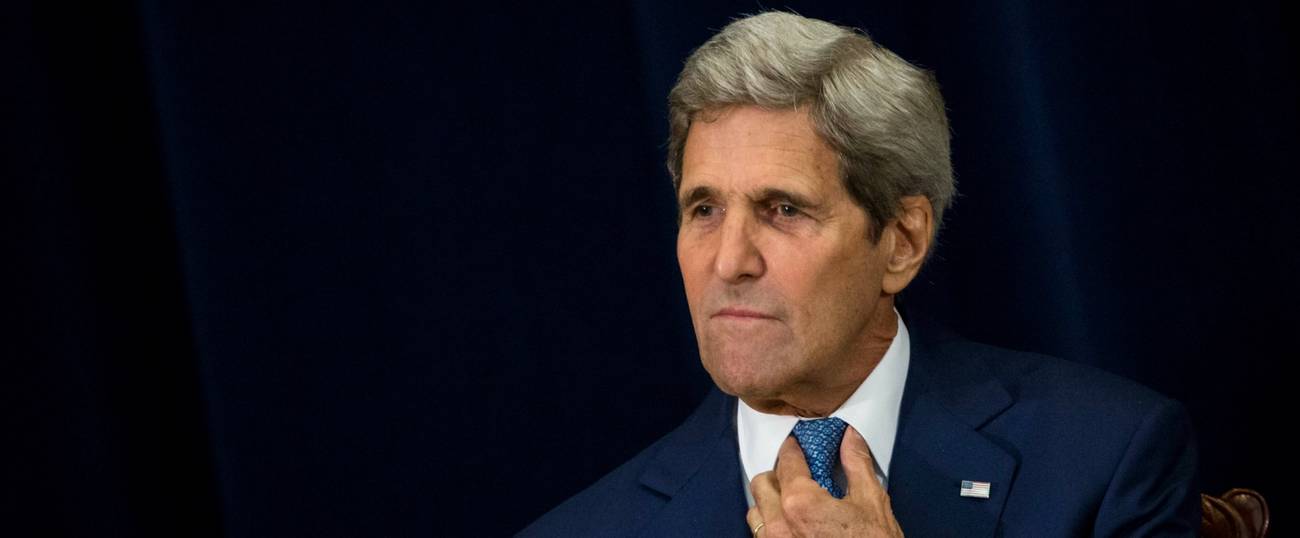John Kerry: If Iran Deal Crumbles, Blame Israel
The White House continues its Jew-baiting campaign with the reported release of Jonathan Pollard




This time around, it wasn’t a dog-whistle. John Kerry came out and said it outright: if the Iran deal gets blocked by Congress, Israel will be to blame. Apparently, Kerry sees it like this: the only way that the representatives of the American people could fail to recognize the excellence of a deal that will keep America out of another Middle East war is if pro-Israel lobby money buys their votes. Why else would Americans torpedo the Joint Comprehensive Plan of Action, unless they are beholden to Jewish and Israeli interests? Outside of places like Iran, anti-Semitic canards rarely get any blunter than that.
Unsurprisingly, the Israelis say they will continue to oppose the deal and won’t be intimidated by Kerry’s threats. But the reality is that the administration appears to be using everything at its disposal to underscore the dual-loyalty theme, which is less directed at Israeli opponents of the deal—who are being perfectly loyal to their own state—than it is at American Jews, a majority of whom already reportedly support it.
Last week’s report that that convicted spy Jonathan Pollard will be paroled from prison 30 years into his life sentence appears to be part of the same icky administration messaging campaign. In 1985, Pollard was arrested for selling American secrets to Israel. There is no doubt that he broke the law by spying against his country and that his offense warranted serious jail time. However, there is also no doubt that Pollard has paid a much higher price than others who have committed similar crimes by giving secrets to American allies like South Korea, Greece, the Philippines, and Saudi Arabia. Instead, Pollard’s sentence is the same handed down to Aldrich Ames and Robert Hanssen, high security officials who were caught spying on behalf of a very dangerous wartime adversary, the Soviet Union.
Ames and Hanssen—the first was responsible for CIA counterintelligence in Europe; the second was responsible for FBI counterintelligence at home—handed over the names of American spies in the Soviet Union, where they were then taken out and shot by the KGB. At the time, however, there was speculation that Pollard had given those names to the Israelis, which they then traded to Moscow in exchange for Soviet Jews. The reality of course is that Pollard was an analyst and would never have had access to that sort of information—a fact that didn’t stop then defense secretary Caspar Weinberger from writing a secret memo to the sentencing judge claiming, incorrectly, that Pollard had committed high treason. It is partly because some in the anti-Pollard camp still believe he got Americans and U.S. allies killed by the Russians that they want to see him rot in prison.
Others, including many in the U.S. intelligence community, hate Pollard because he represents a failure on their part: Pollard had mental health issues and was a drug user, which is why he was stripped of his security clearances. So, when after his clearances were restored, and he was caught selling secrets, it counted as yet another American counterintelligence failure. In both cases, the source of the decades-long vendetta against Pollard can fairly be described as a case of bureaucratic ass-covering run amuck. There are also those inside and outside the intelligence community who apparently wanted to teach “the Jews” a lesson by locking up Pollard and throwing away the key. As well, there are those in the pro-Pollard camp who believe he’s a hero for his service done to the Jewish state.
The White House is correct in perceiving that the Pollard case represents an enormously emotional issue that strikes a raw nerve with Jews and non-Jews alike. And it appears this is why Pollard will be released in the Fall—to highlight the dual loyalty theme as the White House bullies the JCPOA through Congress. The message is not a subtle one: Remember, when you see opposition to the Iran deal, American Jews have betrayed their country in the past, and Israel has been disloyal to its superpower patron before. So, get in line behind the Iran deal—unless you want to tar yourself as a traitor, like Jonathan Pollard.
However, the reality is that Pollard cannot and must not be defended as a Jew. Indeed, the paradox of the Pollard case is that to understand it as a special instance—e.g., he deserves especially harsh treatment in order to show that American Jews have no love for Jewish spies, or a special get-out-of-jail-free card for helping Israel—only feeds the flames of the noxious dual loyalty issue. Accordingly, the Pollard case should be properly understood in terms of American national security and the American justice system. It is right that he was sentenced to prison for breaking the law, but it is wrong he has been forced to pay a much higher penalty than others who did the same. Pollard deserves fair treatment. Anything else is a problem for American Jews —and for America as a whole.
What’s most troubling about the White House’s Jew-baiting campaign is that it appears to be a deliberate attempt to turn the debate about the Iran deal into a debate about the influence of rich, powerful Jews with suspect loyalties to their home country. The fact is, the Iran deal isn’t bad because Israel says so, but because it’s bad for America. Another sad fact is that when you ally your country with an obscurantist, anti-Semitic, criminal regime, you’re bound to adopt some of their tactics.
Lee Smith is the author of The Permanent Coup: How Enemies Foreign and Domestic Targeted the American President (2020).